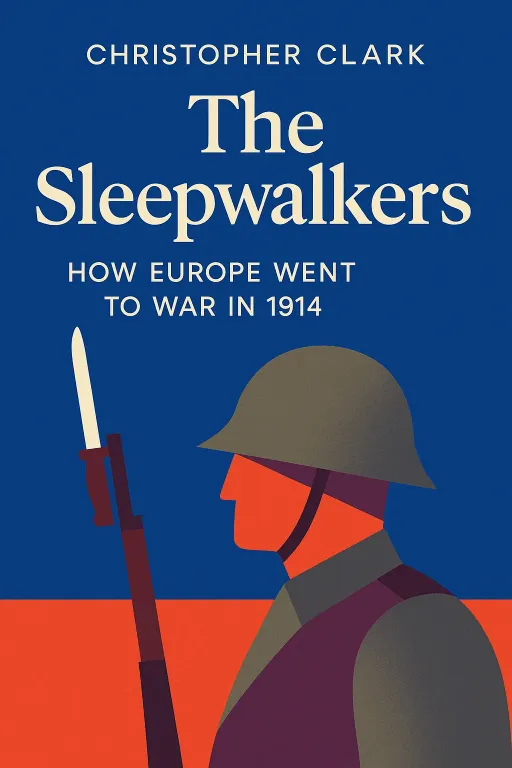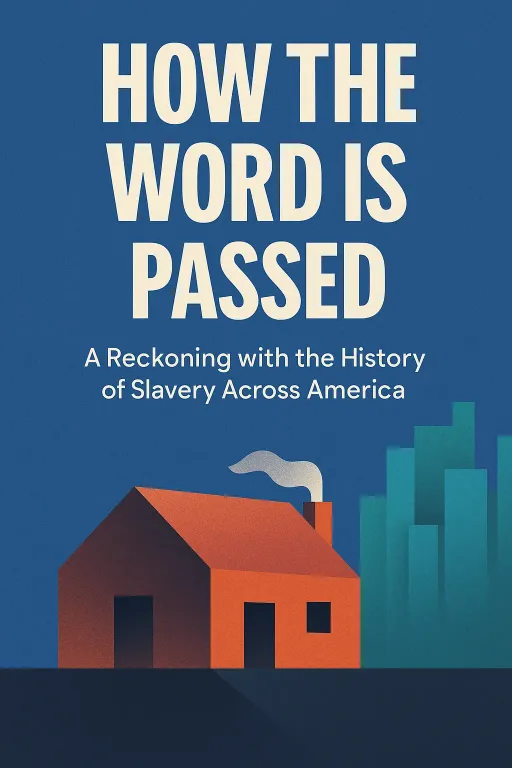
The Sleepwalkers
11 minHow Europe Went to War in 1914
Introduction
Narrator: On a sunny morning in Sarajevo, June 28, 1914, a motorcade carrying Archduke Franz Ferdinand, heir to the Austro-Hungarian throne, made a fateful wrong turn. After a failed bomb attack earlier that day, the driver, confused about a change in plans, stalled the car directly in front of a young Bosnian Serb nationalist named Gavrilo Princip. Seizing the improbable opportunity, Princip stepped forward, raised his pistol, and fired two shots. Those two bullets would not only end the lives of the Archduke and his wife, Sophie, but would also set in motion a chain of events that would plunge the world into a catastrophic war, killing millions and shattering empires. How could a single act of terrorism by a small group of conspirators ignite a global conflict? In his seminal work, The Sleepwalkers: How Europe Went to War in 1914, historian Christopher Clark unravels this very question. He moves beyond the simple search for blame to explore the complex, interconnected system of decisions, miscalculations, and shared political cultures that led the leaders of Europe, like sleepwalkers, to step off the precipice of peace and into the abyss of war.
The Serbian Tinderbox
Key Insight 1
Narrator: The road to World War I did not begin in the grand capitals of Europe, but in the turbulent political landscape of Serbia. The book reveals a nation seething with a potent and aggressive form of nationalism, fueled by the dream of a "Greater Serbia" that would unite all Serbs, many of whom lived under the rule of the neighboring Austro-Hungarian and Ottoman Empires. This was not a fringe idea; it was a central pillar of the nation's identity.
The political climate was incredibly volatile. A pivotal event occurred in 1903 with the brutal assassination of Serbia’s own King Alexandar and Queen Draga. A cabal of military officers, disgusted with the ruling dynasty, stormed the royal palace in Belgrade. After a frantic search, they discovered the royal couple hiding in a secret chamber and murdered them with shocking brutality, throwing their mutilated bodies from a palace balcony. This regicide installed a new dynasty, but it also cemented the power of a shadowy network of conspirators within the military, led by figures like Dragutin Dimitrijević, known as "Apis." This network, which would later form the secret society known as the "Black Hand," became a state within a state, championing the cause of Serbian expansion through violence and subversion, often operating beyond the control of the civilian government. It was this very network that would provide the training, weapons, and logistical support for Gavrilo Princip and his fellow assassins.
The Austro-Hungarian Dilemma
Key Insight 2
Narrator: Across the border, the Austro-Hungarian Empire was a sprawling, multi-ethnic entity grappling with its own internal crises. Clark portrays it not as a decrepit state on the verge of collapse, but as a complex system defined by institutionalized conflict. The 1867 Compromise had created a "dual monarchy," splitting power between a German-dominated Austria and a Magyar-dominated Hungary. This arrangement left the empire’s many other ethnic groups, particularly the Slavs, feeling disenfranchised and resentful.
Vienna’s primary foreign policy challenge was the "Serbian problem." The rise of Serbian nationalism was seen as an existential threat, capable of inciting rebellion among the empire's own South Slav populations. The Austrian leadership was deeply divided on how to respond. Figures like General Conrad von Hötzendorf, the chief of the General Staff, consistently advocated for a preventive war to crush Serbia once and for all. Others, including the assassinated Archduke Franz Ferdinand himself, favored reform and diplomacy, hoping to grant more autonomy to the Slavs and thus neutralize the appeal of Serbian irredentism. The assassination in Sarajevo eliminated the most powerful voice for peace within the monarchy and empowered the hawks, who saw the attack as the perfect justification for the war they had long desired.
The Polarization of Europe
Key Insight 3
Narrator: The conflict between Austria-Hungary and Serbia could have remained a localized affair, but it erupted within a Europe that had become a geopolitical powder keg. Clark argues that the polarization of the continent into two rigid, opposing alliance blocs was a crucial precondition for the war. On one side stood the Triple Alliance of Germany, Austria-Hungary, and Italy. On the other was the Triple Entente, an interlocking set of agreements binding France, Russia, and Great Britain.
This bipolar system did not cause the war, but it created the transmission mechanism for a regional crisis to go global. The book details how this system solidified through a series of diplomatic maneuvers and crises. A key moment was the Agadir Crisis of 1911, when Germany challenged French influence in Morocco by sending a gunboat to the port of Agadir. Intended to test the Anglo-French Entente, the move backfired spectacularly. Britain stood firmly with France, and Germany was forced into a diplomatic retreat. The crisis didn't create the alliance, but it hardened it, reinforcing the perception in London and Paris that Germany was an aggressive and unpredictable power. This meant that when Austria-Hungary moved against Serbia, Russia felt compelled to defend its Slavic client, and France, in turn, was bound to support Russia against Germany.
The Agency of the Actors
Key Insight 4
Narrator: The Sleepwalkers powerfully argues that the war was not an inevitable outcome of impersonal forces, but the result of choices made by a small circle of men. These leaders were not evil monsters bent on destruction, but they operated within a shared culture of risk, honor, and "masculine" assertiveness that prized firmness over compromise. They were sleepwalking because, while they were conscious of their individual actions, they were blind to the catastrophic consequences of their collective behavior.
A telling example is the state visit of French President Raymond Poincaré to Russia in July 1914, just as the crisis was reaching its boiling point. While the official purpose was diplomatic pleasantries, Poincaré used the trip to deliver a clear message: if the conflict in the Balkans led to war, France would stand firmly with Russia. He repeatedly assured the Tsar of France's unwavering support, effectively giving Russia a "blank cheque" to be aggressive in its own right. This encouragement stiffened Russia's resolve to mobilize its forces in defense of Serbia, a move that Germany would interpret as a direct threat, thereby triggering its own war plans. Poincaré’s actions show how personal assurances and a commitment to "firmness" closed the door on diplomatic solutions and pushed Europe closer to war.
The July Crisis: A Cascade of Miscalculation
Key Insight 5
Narrator: The five weeks between the assassination and the outbreak of war were a cascade of miscalculations and failed diplomacy. Austria-Hungary, emboldened by Germany’s infamous "blank cheque" of unconditional support, issued an ultimatum to Serbia on July 23. The ultimatum was deliberately designed to be unacceptable, containing demands that no sovereign nation could fully accept, such as allowing Austrian officials to conduct investigations on Serbian soil.
Serbia’s response was a masterclass in diplomatic maneuvering. It accepted most of the terms but rejected the crucial points regarding its sovereignty, framing its reply in such a conciliatory tone that it appeared to be the reasonable party. The Kaiser himself, upon reading the Serbian reply, believed it removed all cause for war. But it was too late. The Austrians, determined to punish Serbia, declared the response insufficient and, on July 28, 1914, declared war. This single act triggered the dominoes of the alliance system. Russia began to mobilize its vast army to defend Serbia. Germany, seeing Russian mobilization as a direct threat, declared war on Russia and, following its rigid Schlieffen Plan, invaded Belgium to attack France. Finally, Britain, outraged by the violation of Belgian neutrality, declared war on Germany. The local war had become a European catastrophe.
Conclusion
Narrator: The single most important takeaway from The Sleepwalkers is that the First World War was not a simple story of aggression and blame. It was a tragedy of miscalculation. The book dismantles the idea of a single guilty party and instead presents a world where all the major powers contributed to a shared failure. The leaders of 1914 were not uniquely foolish or malevolent; they were intelligent, modern men who were nevertheless trapped in a system of their own making, unable to foresee the horrific outcome of their decisions.
Clark's analysis leaves us with a chillingly relevant question for our own time: In an interconnected world of complex alliances and rapid information flow, how can we ensure that today's leaders are not also sleepwalking? How can we foster a political culture that values foresight, empathy, and communication over the dangerous allure of "firmness" and strategic risk-taking, before we too find ourselves on the brink of a catastrophe we never intended to create?









